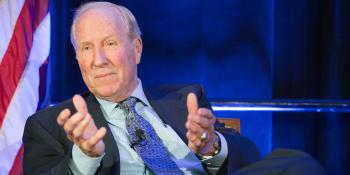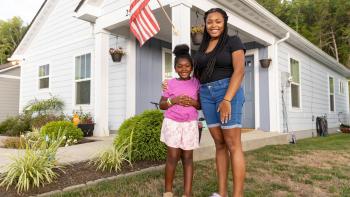
A difficult year that highlighted the importance of being able to afford the cost of home
In the following essay, originally published June 10, 2021, Habitat for Humanity International board member Ronald Terwilliger reflects on the second anniversary of Habitat’s Cost of Home U.S. advocacy campaign and why he is a longtime supporter of Habitat’s work.
During my 50-year career as a homebuilder, I’ve seen firsthand the difference that a stable home can make. A home is the most basic level of infrastructure. A home shapes every part of a person’s life, and so too the direction of our communities and our economy.
While I know the transformational potential that a safe, affordable and healthy home makes in the lives of families, I also know how serious the housing affordability challenges are today in the U.S. Even before the coronavirus pandemic, more than 17 million U.S. households were paying half or more of their income on a place to live.
We already had a shortage of affordable homes before the pandemic, and now our nation’s housing supply is at historic lows for entry-level homes for purchase. Builders often find that, even when land is affordable, houses in disinvested communities — urban and rural — cost more to purchase and repair than could be recouped in resale. There is no incentive to buy and invest in the repairs needed to make these homes decent. This reality leaves these communities and homeowners stuck in a downward spiral.
This is one of the many reasons I have been a dedicated supporter of Habitat for Humanity for more than two decades. Habitat works and builds in these communities. As co-chair of Habitat’s U.S. advocacy campaign, I know that public policies can help provide the solutions these communities need.
The pandemic has further exposed the need to ensure long-term affordability, showing that even a slight change in a family’s income could make their cost of home no longer affordable.
Reflecting on the campaign’s first two years, I’m struck by how the COVID-19 pandemic has made achieving housing affordability even more difficult. The pandemic has further exposed the need to ensure long-term affordability, showing that even a slight change in a family’s income could make their cost of home no longer affordable. Additionally, it has highlighted the role that housing policies have played in causing our nation’s racial inequities and the role they must play in remedying them.
When we first launched Cost of Home in June 2019, we didn’t foresee a global pandemic or a national reckoning on systemic racism, but we knew that, to maximize our potential for impact, the five-year campaign would need to remain agile. I’m proud that this agility allowed the campaign to play a critical role in responding to exacerbated housing needs as a result of the pandemic and that the campaign’s commitment to advocating for anti-racist housing and land-use policies at the local, state and federal levels has helped us to respond to the national imperative for racial equity.
A few examples:
Over the past year, Sussex County Habitat in Delaware has worked with other housing providers, legal aid societies and collaborative organizations to increase the amount of funding available for renters and homeowner emergency assistance payments in response to the pandemic. As a result of this advocacy effort, Delaware offered housing assistance to low-income households experiencing COVID-related job loss. Through CARES Act dollars, the state provided $20 million each for homeowner assistance and renter assistance, which will support more than 4,000 individuals.
In Florida, Habitat Broward advocated for the creation of a county racial equity task force. In December 2020, Broward County Commission finalized and approved the creation of a task force to focus on identifying systemic and racial inequities and the development of a plan to eliminate racism and create greater equity in Broward County. The Racial Equity Task Force will consist of 37 members from a broad cross-section of the communities that have been negatively impacted by systemic and institutional racism.
Federally, the American Rescue Plan Act passed earlier this year included $9.96 billion for a homeowner assistance fund, which was a key Cost of Home priority to ensure families financially impacted by the pandemic could remain in their homes. The fund enables all 50 states to offer direct assistance to homeowners who are behind on their mortgage or facing foreclosure due to the pandemic.
In total, more than 4 million people have increased access to an affordable place to call home, thanks to local Habitat affiliates, partners, volunteers and community members across the country’s efforts to change policies and systems.
The past two years have not been easy, but I’m encouraged by our progress and optimistic about the opportunities that lie ahead. Even with the crucial resources and protections that have been provided by Congress and local and state governments to families impacted by COVID-19, more action and support are needed at all levels of government to help ensure that all families can participate in our nation’s economic recovery and achieve long-term stability and security.
Currently, at the federal level, several bills moving through Congress would make high-impact investments in housing infrastructure and should be priorities for an economic recovery and infrastructure package. A pair of bills would help housing providers — like Habitat — convert dilapidated homes into affordable homeownership opportunities, focusing on neighborhoods where the for-profit, private sector is unable to do this on its own.
The Neighborhood Homes Investment Act would create a tax credit to remove financial disincentives to investing in these properties. The Restoring Communities Left Behind Act would ensure that newly rehabilitated and created homes are affordable to residents and part of an overall strategy that includes neighborhood residents and local businesses in their community’s economic recovery.
These investments, coupled with local and state policy change, can begin to unlock economic recovery and help ignite a virtuous cycle of rising home values that removes disincentives to broader neighborhood reinvestment while creating thousands of jobs, remediating urgent health hazards, and narrowing our nation’s racial wealth gap. Fixing our housing supply shortage and repairing our deteriorating housing stock are critical infrastructure investments that will pay enormous dividends for our economy, health and overall wellbeing.
